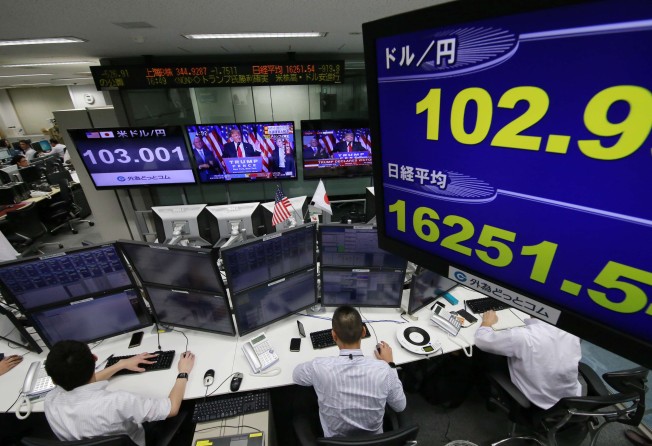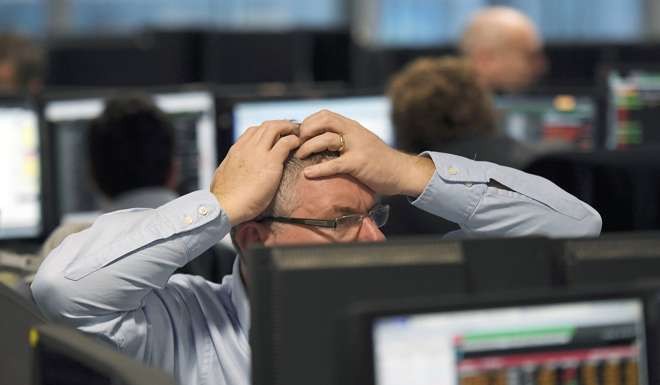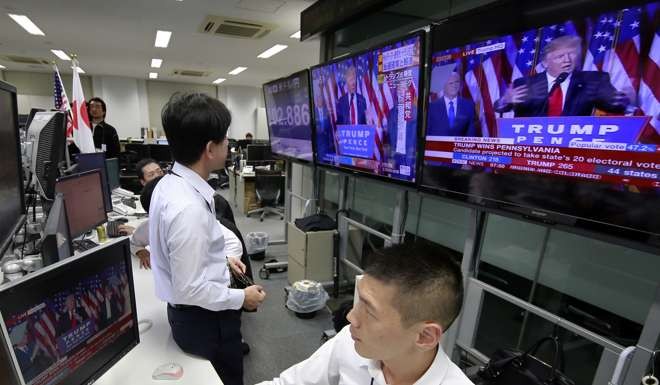This one predictable trend will emerge from Donald Trump’s shock election victory
‘The abiding truth about changes of government is that they have remarkably little impact on economic fundamentals’

The American people have spoken and so have global markets. The former wanted a big change, while the latter are highly change averse, so global investors responded to the Trump triumph with a mighty vote of no confidence. What happens next is not clear.
However, we do know some things. First, markets always overreact to news they were not expecting and, my oh my, they sure were not expecting this result. Thus, share prices have plunged, there has been heavy selling of the US dollar etc. etc.
As night follows day, some of this panicky trading will reverse itself quite soon. Next up, at least according to the normal post-election script, there will be assurances that things said in the heat of the campaign were not quite as stated and vague statements about business as usual will be uttered.
The problem is that the Republican victory, sweeping not just the White House but also the two tiers of the legislature, has not gone according to the scripts carefully prepared by some of the “smartest” people in the investment world, let alone in the world of politics but then again that world is in a state of turmoil, producing shocks to the system not just in the United States but also in places like Britain where business as usual is no longer regarded as a desirable state of affairs by large swathes of the public.
However, before pressing the panic button it is useful to consider a wider perspective of what usually happens after elections, even those that produce major upsets.
The abiding truth about changes of government is that they have remarkably little impact on economic fundamentals. There is however an important caveat here because while governments find it remarkably hard to defy economic trends and improve the state of economies, there are salutary examples of governments managing to make things worse.

A case in point is Venezuela, an oil rich nation that enjoyed significantly higher standards of living than many other countries in the region. In a remarkably short space of time the then new Chavez administration managed to squander this considerable wealth, reducing the nation to a state of economic crisis. However even here it is not possible to blame the government alone because one of its biggest problems was the enormous decline in oil price; something well beyond the control of the Caracas government.
On the other end of the spectrum history records the valiant but unsuccessful efforts of the Roosevelt administration to pull America out of the Great Depression that was not ended by the government’s New Deal policies, even though they helped alleviate some of its impact, but by America entering the second world war.

Despite the doom-laden picture Donald Trump painted of the state of America before the election, it is not even remotely in a situation that compares with the 1920s and 1930s, so the new President faces challenges that are admittedly more complex but, frankly, less profound. Moreover, his ability to make changes to the economy are, if anything, even more constrained nowadays by the enormous interdependence of the global economy.
Then there are the constraints of America’s political system that theoretically provides the president with enormous power but in reality ties the executive’s hands both at the national and state level. The new President enjoys the luxury of having a legislature filled with members of his party but many of them are not his friends and mid-term elections may very well change the composition of these bodies just when he needs them most.
My guess is that a period of calm will soon ensue
Donald Trump has promised to do a great deal, a lot of these promises are pretty vague but they seem to add up to a package of big giveaways to those with money, increased isolationism, increased protectionism and a turning back of the clock on many social policies. Assuming he even gets off the starting block with any of this, not least the barmy plan to get Mexico to pay for building a wall between the two countries, he will run into obstacles at every turn. How a man like Trump will react to being obstructed is uncertain but in normal circumstances frustration produces compromise.
Trump however prides himself on shunning the normal so let’s see how that works out for him. Meanwhile, aside from the hectic market response that greeted his election, let’s also see what investors will do in the long run. My guess is that a period of calm will soon ensue and even if the Trump administration turns out to be a disaster on many fronts, Americans will go to the polls again in four years’ time and can opt for another change of direction. That’s what makes the system fundamentally strong and should give solace to long term investors.
Stephen Vines runs companies in the food sector and moonlights as a journalist and a broadcaster